Returning Home to Nigeria
Last week I returned to Nigeria for the second time in my life and the first time in 41.5 years.
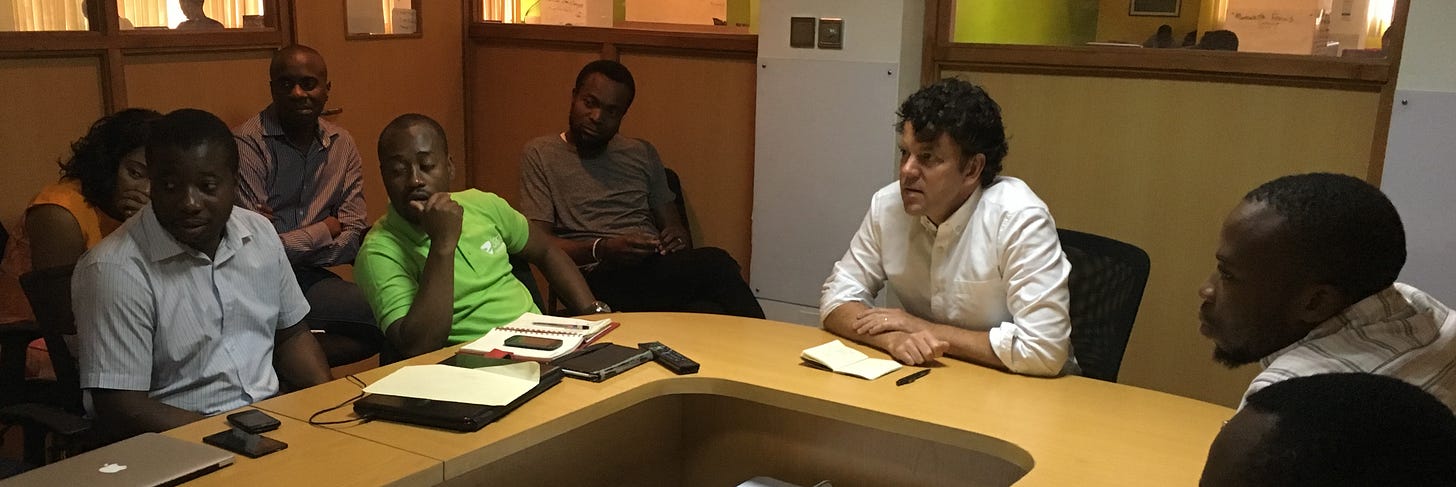
I got to sit down with founders at Co-Creation Hub, a social entrepreneurship hub in Lagos.
Last week I returned to Nigeria for the second time in my life and the first time in 41.5 years.
“You are welcome!” was the response I heard everywhere as I shared my story of being born in Wusasa hospital in Zaria to parents who were serving in the Peace Corps.
My father spent his career doing relief and development work in Africa and all over the world. I have my parents to thank for the fortune of being born in Nigeria and growing up in Nairobi, Kenya.
So, returning to Lagos last week to explore the tech scene and get a sense of the community was an honor for me, and it was moving to see the dynamism in the market. It felt like a city and country lurching through the economic growth of creating a middle class.
What I heard from people was that the lens they wanted me to view the market was that of opportunity. Nigeria warrants investment because it is experiencing an explosion of connectivity and adoption of technology in a massive market. And it offers entry to an even broader pan-African market.
The reflection to me is how the ecosystem in Nigeria is intersecting with my career in a different way than my parents. But the development work in Africa in their generation laid the groundwork for the investment opportunities that exist in the market today.
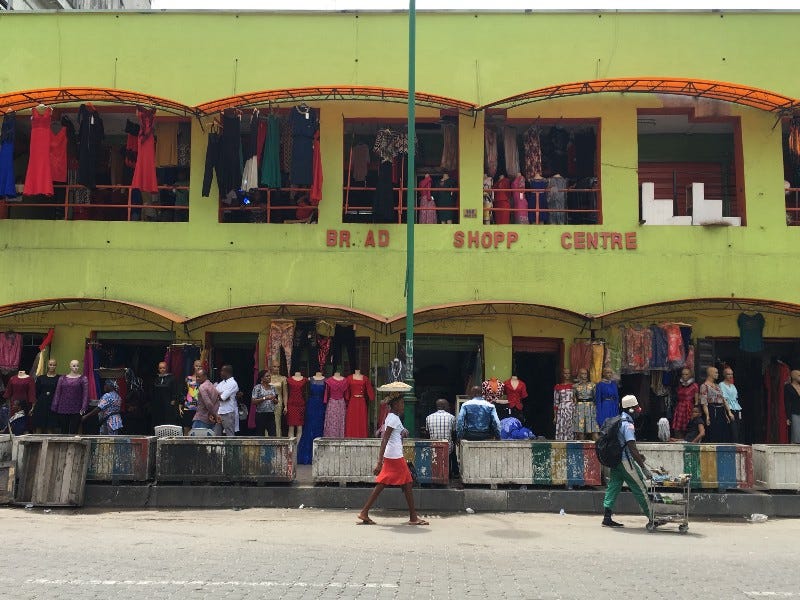
A view near the Balogun Market near the Central Business District.
Market Dynamics & Drivers
“Nigerians love Twitter!” I heard several times during my week in Lagos. So many Nigerians are connecting to the internet for the first time through smartphone and the first thing they are doing is communicating with each other.
Lagos is a city of 20MM people, and Nigeria a country of 180MM. It’s a huge market with dynamics that are fueling the movement of millions of people into the middle class. The traffic reflects infrastructure that is struggling to keep up with the number of cars on the road. As we drove through Lagos, I felt the city heaving its way through a transformation. And the city is expected to double in size in the next 15–20 years.
Everyone in Nigeria has a mobile phone. The “leapfrogging” of wireless over connecting to the internet via landlines is old news. Many people are still on feature phones, but within a few years, everyone will be on an Android device.
“Android phones made in China are $60 now, when they are $20, everyone will have one.”
Just consider these market dynamics:
Nigeria is a market of 180MM people
50% under 30yrs old
70% mobile penetration
40% education penetration
80% of country has no bank account
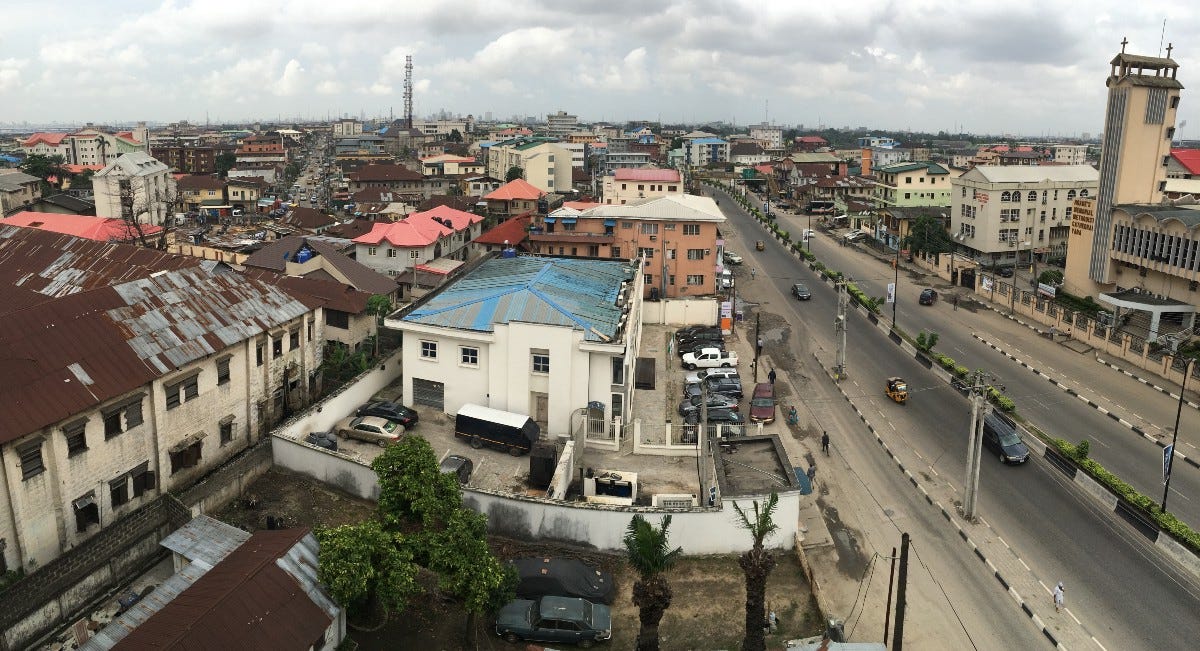
The view from the rooftop of the CCHub overlooking Apata, a popular location for tech startups due to the fiber line on the mainland.
Nigeria holds huge opportunity as a market. The vanguards in the startup scene are the first movers in market specific applications — travel, e-commerce, payments, logistics.
The winners in these sectors and others will need to have deep understanding of the Nigerian market, and there is a huge opportunity for home grown companies to define the success in the African market.
Real companies solving real problems
The companies I met with were approaching challenges based on a deep understanding of the Nigerian market.
Wakanow is the leading online travel service founded by my host for the week, Obinna Ekezie. It’s gaining traction because many Africans are beginning to travel for work and leisure around Africa for the first time. Since many customers are new to the internet, Wakanow has opened travel centers around the country so it has a brick and mortar presence providing a point of entry to online travel with customers ultimately moving to the online experience.
Andela is building a purpose-driven software consulting company with development centers in Nigeria and Nairobi. They provide a full computer science training program for its new hires and have been overwhelmed by applications to join the company. Ultimately, I’d expect Andela “graduates” to lead a next generation of startup founders in kickstarting the tech virtuous cycle. Their growth led to a recent investment of $24mm by the Chan Zuckerberg Initiative, the first investment that they’ve lead.
At the Co-creation Hub, a socially focused accelerator program, I met LifeBank, an early stage company tracking blood supplies at hospitals and responding to requests for blood via Twitter in crisis situations. They’ve built a logistics network to manage the transport of blood between hospitals and act as a virtual blood bank for the country.
I met many more companies during my week, and I cover a more comprehensive review of them in my Lagos Startup Market report.
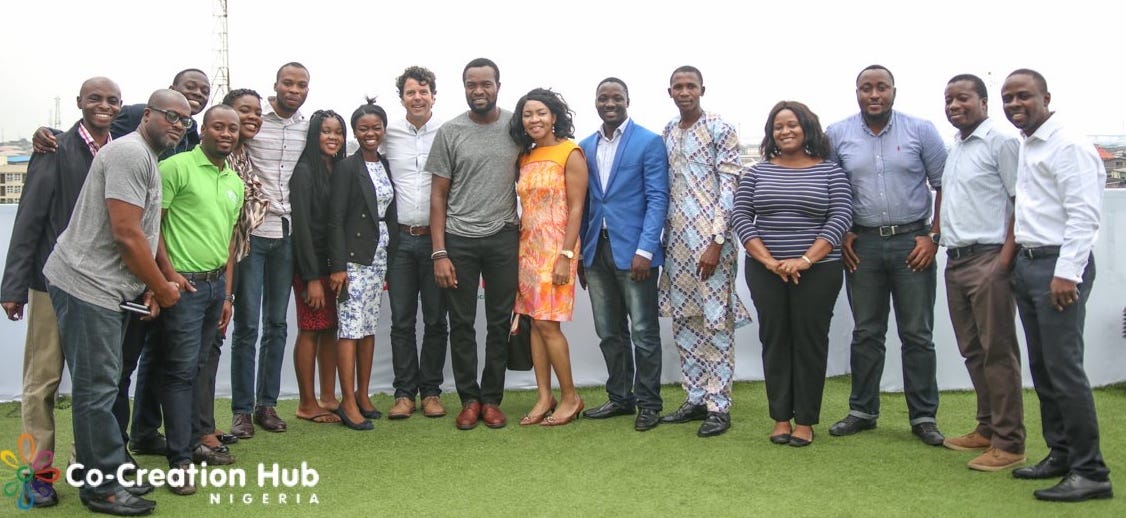
The group of founders I met at Co-Creation Hub convened by CChub and Idea.
Challenges and Opportunities
As you drive around Lagos, you can feel the heaving growth of a city and country on the march with people moving out of abject poverty to a more middle class lifestyle. I’d relate it to similar transformations in the BRIC countries, in particular Brazil. Economic growth is chaotic, the city sometimes feels overwhelmed by people and traffic. And Lagos is experiencing the rapid urbanization of the country and continent as people move to cities seeking opportunity and burst at the seems to contain the people.
Everywhere we went, people talked of the traffic. Traffic is chaos and slows to a halt during rush hour, the daily commute for many people is brutal.
I was surprised to be sitting in several meetings when the lights went out. Sitting in the dark for 10 seconds, conversation continued without interruption. Quickly the generator kicked in and power came back on. Lago’s utility grid is notoriously unreliable and everyone has a diesel generator and inverter.
The Nigerian economy is completely reliant on oil production. There is no tourism economy. Most goods, even food is imported rather than produced in the country.
An entrepreneur views these challenges as tremendous opportunities.
As Android smartphone prices reach $20USD, everyone will be online. Education platforms delivered to the smartphone with lessons that cost pennies will spur literacy and I heard repeatedly about the emphasis on STEM education. E-commerce is already thriving as companies like Jumia and Kongo are building out their own delivery networks, not relying on UPS or DHL like the US. To pay for goods and services, there is a huge opportunity in FinTech to create smartphone based payments and savings platforms for the unbanked with no dominant player yet. Technology has the opportunity to transform agriculture in a country that needs to grow more of its own food. And my prediction is that the utility grid problems will be solved privately as costs drop for clean energy like solar and wind, and energy storage solutions like Tesla’s Powerpack drop in price.
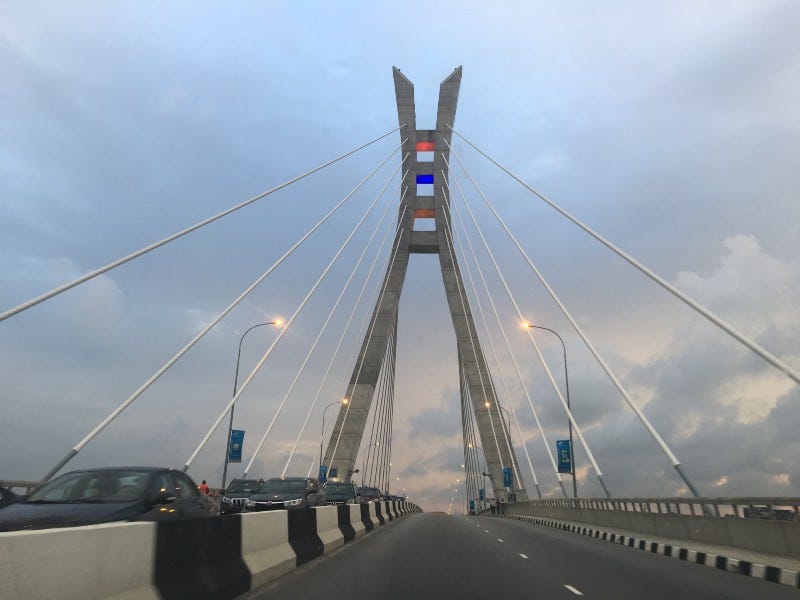
The Lekki-Ikoyi Link Bridge at a fortunate moment when we were traveling against traffic.
Africa Rising
My first meeting of the week was with Dr. Ombola Johnson, the former Nigerian Minister of Technology, and now a VC with a firm called TLcom. In prepping for our meeting, I read the transcript of a speech she’d given to open DEMO Africa in Lagos in 2014. In it, she framed the contrasts in our perception of Africa as a continent, and the transformation over the last 15 years.
On May 13th 2000, The Economist, an international current affairs magazine, had on its cover page a silhouette of the African continent, within it was the image of an armed guerrilla fighter; its caption read: “The Hopeless Continent”. Within the pages of that edition, the prognosis on Africa encapsulated the prevailing beliefs held not only by the majority of those living outside its borders, but also by those that considered themselves ‘trapped’ within it. Africa — a starving, poor, disease ridden, fractured, war-torn, corrupt, dying mass of humanity … described by former UK Prime Minister, Tony Blair, as a “scar on the conscience of the world”.
Fast forward a decade; December 3rd 2011, the cover page of The Economist bears the image of a boy running across a savannah landscape at sunrise, flying a rainbow coloured kite shaped in the image of the African continent. The caption reads: “Africa Rising”. Within its pages the magazine paints a scenario of dynamism, resilient entrepreneurial activity, fledging…yet growing economies, nascent…yet stabilising democracies, a population getting healthier and more educated, an expanding middle class signifying a potential to even out the distribution of wealth. An Africa, that is “getting its act together”. 54 countries of different ethnicity, culture, language and different levels of development, home to 1.1bn people, the second fastest growing regional economy (second to Asia) and home to more than half of the world’s fastest growing economies.
Reflecting on my experience in Lagos, viewing Nigeria and more broadly pan-Africa through the lens of opportunity rather than charity is incredibly exciting for me. It's a huge market, experiencing transformative growth, with major opportunities for entrepreneurs to solve real problems for real people.
One of my memories of childhood is visiting projects with my Dad in villages where Church World Service was providing relief efforts. The blueprint was often similar — drill a well to provide clean water, build a school to deliver the first education in a community, and build a small clinic to provide healthcare.
On my visit to Lagos, my friend Ayodele took me to his brother-in-law’s IVF clinic. The facility was state of the art and bustling and even had a VIP entrance for women who were traveling for fertility treatments.
In a generation, the Africa I know has been transformed. I’m excited to see and participate in the transformation over the next generation as the opportunity that exists in Nigeria and Africa is seized by entrepreneurs creating jobs and driving the economy forward.
Thank you to all my new friends in Lagos for a wonderful welcome home. I can’t wait to get back.
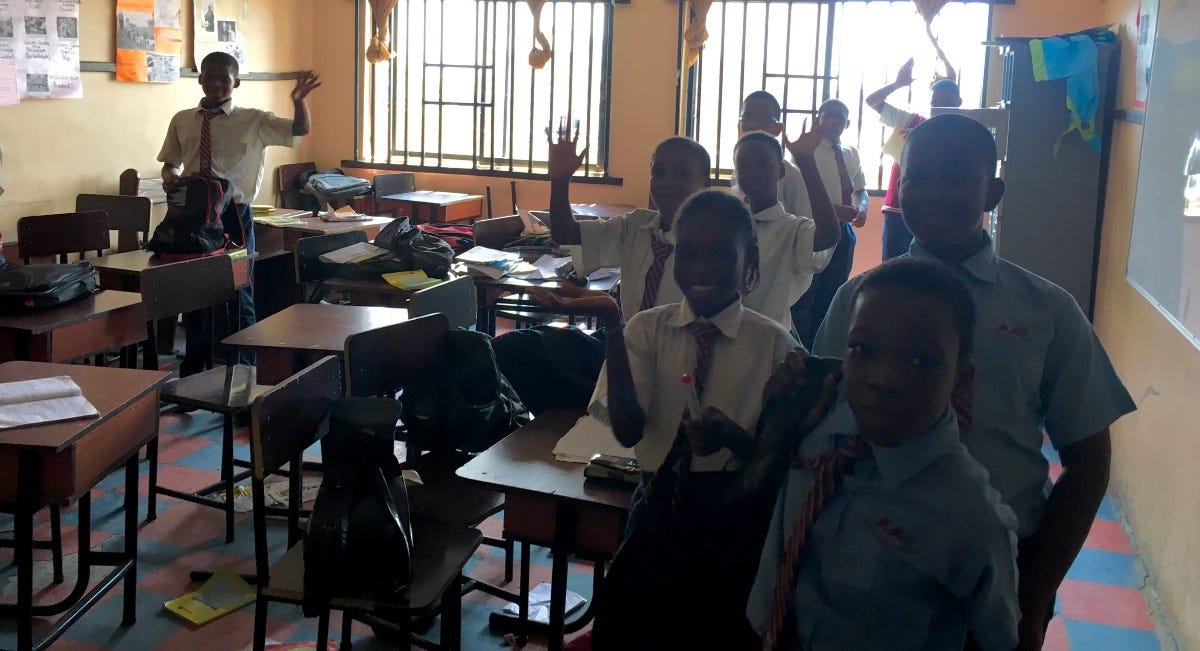
Future entrepreneurs at the Apata Memorial school. Thanks to Ayodele Apata for the tour of his family’s school.
I’d like to extend a sincere thank you to the many people I met with who shared their time and experience with me. Wiebe Boer, Obinna Ekezie, Dr. Omobola Johnson at TLcom, Helen Anatogu at iDEA, ‘Bosun Tijan and Tunji Elesoi at CcHub, Collins Onuegbu at the Lagos Angel Network, Jude Abaga of Chocolate City Group, Judith Okonkwo at Ìmísí 3D, Seni Sulyman at Andela, Kenneth Igbomor at CNBC Africa, Frank Aigbogun at Business Day, James Agada at Computer Warehouse Group.




